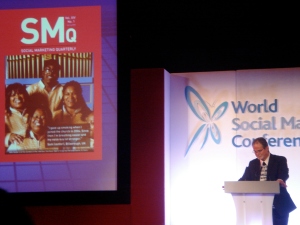 Perhaps it’s the time of year, but has anyone else noticed that more people are churning out more good content? Many different items I come across deserve its own post, however, then it’s on to the next good nugget I find. Thus, I’m going to do these round-ups every once and awhile as I don’t want you to miss out on all the good information.
Perhaps it’s the time of year, but has anyone else noticed that more people are churning out more good content? Many different items I come across deserve its own post, however, then it’s on to the next good nugget I find. Thus, I’m going to do these round-ups every once and awhile as I don’t want you to miss out on all the good information.
- Have a cause or issue that you’re passionate about? If so, you will love this article by Michael Silberman on the Huffington Post. In it, Michael shares lessons learned when it comes to digital organizing from the 350 days movement–what he terms the “most widespread day of political action in history.” I personally like how Michael emphasizes the importance of mission over technology, and how he creatively shows the importance of creative storytelling by effectively telling the 350 days story to us.
- Are you or your clients curious about the latest and great in customer relationship management models? Web Strategist Jeremiah Owyang recently wrote up an in-depth post that gives an overview of 31 different CRM companies that are worth a look through.
- Recently, I touched upon how online contests and competitions were growing in popularity–seems it’s still growing. Pepsi recently announced that they were going to fore go Superbowl ads, and instead, create a micro-site slash giving competition called the “Pepsi Refresh Project.” Beth Kanter shared her thoughts about Pepsi’s move following the Chase Bank fund-raising issue as well.
- Twitter is the Oxford Dictionary’s 2009 Word of the Year. However, another contender could have been the word innovation. Look at Time Magazine’s list of the “Top 50 Inventions of 2009”. Or, check out Popular Mechanics list of “The Best 50 Inventions in the Past 50 Years.” (Guess Santa isn’t the only one making his list and checking it twice this time of year.)
- Social marketeers: Are you looking to connect with colleagues? Try one of these three upcoming social marketing conferences summed up nicely by Craig Lefebvre. A conference of sorts that I also look forward to debuting is BIBA, presented by Peter Corbett’s iStrategy Labs. BIBA looks to gather big minds with big ideas to make big actions.
- Because it’s worth mentioning again, did you get a chance to read Philip Kotler’s and Nancy Lee’s article in Stanford’s Innovation Review about Corporate Social Marketing?
A Social Shout-out
Not only are good news items coming up, but I’ve also expanded my RSS reader with some blogs I encourage you to get to know:
Social Herder: If you don’t know Will Robinson, you might want to. Will writes on all things social entrepreneurship, non-profits and general do-goodery. You can catch Will at his blog, on Twitter, or at his current gig with Ogilvy PR.
Justice for All: If you are interested in a mash-up of human rights, social enterprise, democracy and law, then you’ll appreciate the enthusiasm of Northwestern senior Akhila Koliset. Not only do I share an interest in advocating human rights with Akhila, but I continue to be inspired by her passion and the voice with which she writes. You can tell she loves to be inspired as much as she is inspiring–just check out her reading list!
What We Give: You’ve probably heard of this one, but if not, you should. Larry Blumenthal is the director of social media strategy at the Robert Wood Johnson Foundation, and adds much value back to the marketplace through both his blog and on his Twitter stream where he talks about how social media is changing philanthropy.
What about you? Any newly discovered blogs or colleagues you’d like to give a social shout-out to?
PS: Often, these “nuggets” are shared sooner through my Twitter account. If you’re on Twitter, let’s connect @socialbttrfly.









